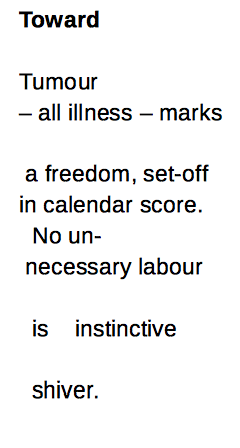Long collection: 42 series of, I guess you could call them, aphorisms, amounting to 400 pages. It’s unfinished. Can’t decide if it’s about Susan Sontag’s orgasm (whose essay on camp I didn’t read), or the Iraq war (you don’t need a “sieve” – or a “halo” – to make marmalade, though I enjoyed the hurried tone for its close). The penultimate “trances” to the first series should illustrate what gets the poet – Wayne Koestenbaum – to exit his mental states:
necking in
semi public, I again
praised my phallus or
what passes as my
phallus and he said “anus”
as if I didn’t have a headache
———-
disastrous plunge into
abyss, but what
is abyss and why do I
call it mother?
This collection seems authentic and post modern. Obviously, it’s not just about sex, neither each “trance” nor how they sing together: so definitely “camp”. I suppose that they consist of their smartness, which is either faux-unique or faux-repetitive. I’d consider it less “sprawl” than addictive.
Every insight adds up, to something, I suppose his father, which lacks closeness. I would like to compare it with O’Hara’s poetry: the latter feels more focused, even-though this collection may not pale next to it.
